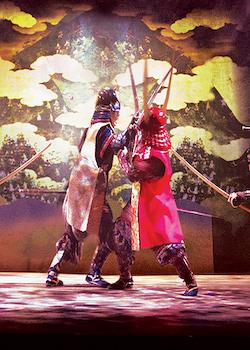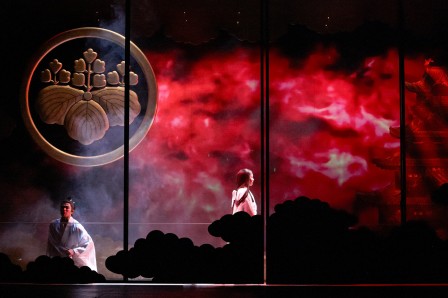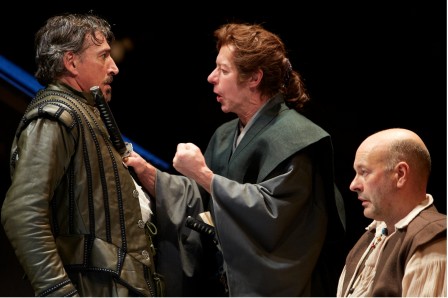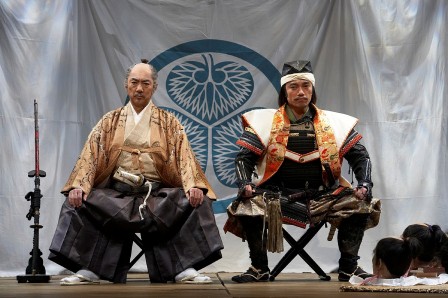Anjin: The Shogun and The English Samurai

By Mike Poulton with Sho Kawai
Sadler’s Wells Theatre
31 January 2013 – 9 February 2013
(Part of the RSC Swan Season, A World Elsewhere)
Review by Susan Meehan
Anjin The Shogun and the English Samurai premiered in Japan in 2009. Following two successful seasons there, its finale is now being held at Sadler’s Wells. This special production in London is a launch event for Japan400, which is celebrating the 400th anniversary of Japan-British relations that began with the arrival of the English ship the Clove in 1613. Various events are being held throughout the UK in 2013 to celebrate this landmark.
This production opened on 31 January, the date of Ieyasu Tokugawa’s birthday, marking 420 years since his birth. It is a completely bilingual production combining the talent of Japanese and British actors and relying, for the translation, on surtitles. The play was written by a British and Japanese author, Mike Poulton and Shoichiro Kawai.
Anjin The Shogun and the English Samurai covers a remarkable period of Japanese history, set at a time of an emerging new world witnessing the establishment of new networks of trade and plunder and a new understanding of the universe which challenged the old certainty of the earth being at the centre.
Will Adams (1564-1620), the future ‘Anjin’ was a native of Gillingham, Kent and believed to be the first Englishman to reach Japan on the Liefde in 1600. He was also one of Britain’s most picturesque and daring maritime traders. This is an epic tale of rare adventures and his rise to become confidant and advisor to the Shogun.
Gregory Doran, the director of Anjin, is Artistic Director of the Royal Shakespeare Company. In a brief conversation before the start of the play, he told me he had approached the play as one would a Shakespeare History. The themes in Shakespeare’s Histories tend to focus on kingship, love, good and evil, destiny and fate and all these are certainly explored in Anjin.
Though the play covers a span of 16 years, from the wrecking of the Liefde to the death of Ieyasu Tokugawa in 1616, it seems ten times longer, purely due to the detailed amount of history it rams in. With all the politicking between the Tokugawa and the Toyotomi and other clans within Japan, the history can, at times, seem a little impenetrable.
Nevertheless, anyone who has watched the 1980s TV mini-series with Richard Chamberlain or read the blockbuster it was based on, Shogun, by James Clavell, should be able to keep up. In 2 hours and 40 minutes, the characters aren’t, of course, developed to the same extent.
The sumptuous staging of this production is unveiled to the beautifully haunting shakuhachi (Japanese bamboo flute) music played by the accomplished Dozan Fujiwara.
Yuichiro Kanai, the set designer, whose award-winning staging of the 2006 Shochiku Grand Kabuki’s production of Twelfth Night after William Shakespeare directed by Yukio Ninagawa, outdid himself once more, ingeniously recreating battle scenes, Japanese castle interiors and lavish screens.
Anjin’s first scene, set in April 1600, is extraordinarily atmospheric. A few crosses on the set bear crucified men and draw the audience in. Screened onto the background, a ship is being tossed around on the waves. The Liefde, with a crew of about 20 sick and dying out of an original crew of 100 or so, is shipwrecked close to Usuki, Oita Prefecture at a time of political turmoil in Japan.
As the survivors, including Will Adams, the ship’s pilot, emerge onto stage they are met by locals as well as Spanish Jesuit priests. The priests, afraid that these newly-arrived anti-Papists will challenge their influence, claim that the sailors are pirates and clamour for their crucifixion.
Domenico, a young and seemingly naïve Japanese Jesuit novice, winningly played by Yuki Furukawa, clocks his superiors’ dishonest and cynical behaviour.
Lord Ieyasu Tokugawa, regent of Japan since the death of Hideyoshi Toyotomi, the first lord of Japan, sends word to spare the crew of the Liefde. It would be unforgivable he feels to treat the visitors so barbarously. Adams visits Ieyasu Tokugawa in Ozaka. The young Domenico is entrusted with keeping an eye on the likeable Adams, played by Stephen Boxer with a convincing and light touch, and acts as his interpreter. He teaches Adams the necessary protocol for his audience with Ieyasu.
Fortunately for Adams, Ieyasu is an enlightened, welcoming and intellectually curious man and they hit it off. Ieyasu is dazzled by Adams’ knowledge of seafaring vessels and the 19 cannon, muskets and cannonballs in the Liefde’s load and takes him into his favour, much to the dismay of the Jesuits.
Not long after, in October 1600, Ieyasu Tokugawa, aided by the cannon brought over by the Liefde, is victorious over the Toyotomi clan at the Battle of Sekigahara. This gives him virtual control over all Japan.
Meanwhile, Domenico, thrilled by the excitement of battle, realises that he has made a wrong career choice and decides to revert to being a samurai.
Ieyasu Tokugawa’s victory is duly recognised by the emperor who makes him Shogun in 1603. A grateful Ieyasu, meanwhile, gives Adams the name Anjin, meaning pilot, and promotes him to hatamoto (‘bannerman’), a prestigious position as direct retainer in the Shogun’s court.
Adams wants to refuse these honours and return to England. In a humorous exchange, Domenico is revealed to be startled and deeply worried at the fact that anyone could reject a Shogun’s wishes. Adams is effectively barred from leaving Japan. This is a touching scene and at this point the man who had been sleeping next to me, not even waking up during the raging scene of the Battle of Sekigahara and the firing of the cannon, briefly woke up. I was pleased that he was able to enjoy this touching and affecting moment.
It is Adams’ destiny to remain in Japan with his new wife Oyuki and his son, Joseph, and daughter, Susanna. As the play evolves, Adams continues a divided man much as Domenico is, but in his case it is between being divided between England and Japan and land and water.
In 1613 an English ship, the Clove, sails into Hirado, Nagasaki Prefecture. This is an exciting point in the play, which packs in a few too many battle scenes. Captain John Saris has arrived intent on establishing a trading post for the British East India Company. The crew meet Adams and suspiciously observe that his Japanese heart has turned him Dutch or Spanish or Portuguese – in any case, they can’t quite trust him and find him conceited. Adams is extremely helpful however in orchestrating Saris’ audience with Tokugawa Ieyasu.
Saris has brought letters from the East India Company and from Adams’ wife Mary, and a likeness of his daughter. All this goes to making Adams rather homesick.
A tiring and weary Ieyasu confides in Adams. He has outlived six of his sons; and his friends and enemies are dying. He fears that the imminent battle in Ozaka will finish him off and suggests that Adams, who’ll be left without a patron, may want to return to England.
Adams prepares to return to England much to the grief of Oyuki who, for the first time, hears about Adams’ family in England from Saris and is heartbroken.
Adams increasingly finds the English contingent boorish. He is told that one of the crew has burnt down a brothel and that another has been accused of rape. Combined with his antipathy towards the coarse Saris, despite being deeply divided, he decides to remain where he is for the present and becomes involved with the Hirado trading factory from 1613.
Not long after, Lady Yododono, a veritable Lady Macbeth played wonderfully by Yoshiko Tokoshima, advances against the Tokugawa once more with her son, Hideyori Toyotomi, and the rest of the Toyotomi family and supporters. The staging again is marvellously atmospheric depicting Ozaka engulfed in a ball of fire. The Tokugawa decisively beat the Toyotomi.
Ieyasu dies the following year, having left a legacy of peace as he had wished. Adams managed to have a last chat with Ieyasu, who had been a mentor and friend. They are obviously fond and respectful of each other. Adams gives Ieyasu a globe which he has made himself. Ieyasu is very happy. It represents the world, which he had desperately wanted to explore for himself.
Adams will continue as a hatamoto under Ieyasu’s son Hidetada’s rule, on the condition that he doesn’t consort with the Christians. In a scene with Hidetada, his son Iemitsu and Adams, they look into space and see a comet, a signifier of change. Adams foresees a worsening of the conflict between Protestants and Catholics in his western world and counsels caution in dealing with the West.
Maybe the comet is Ieyasu, the trio marvel.
In any case, the speeding comet represents the brief period of a British trading post in Hirado, closed after ten years in 1623, and the end of Ieyasu’s enlightened and welcoming attitude to the outside world.
Britain wouldn’t engage in meaningful links with Japan again for over 200 years.
The play didn’t leave me with any particular new insights or particularly memorable quotes. It seemed a bit too similar to the 1980s mini-series, Shogun, featuring Richard Chamberlain and based on James Clavell’s blockbuster of the same name. I had hoped it would take a new perspective on the story. Given the fact that so much was going on and there was little opportunity to fully develop the characters, I failed to fully warm to them, though recognise the wonderful performances given by Stephen Boxer, the legendary Masachika Ichimura as Ieyasu, Yuki Furakawa as Domenico, Yoshiko Tokoshima as Lady Yododono and the rest of the Japanese cast.
The irony it left me with is that Will Adams, so welcomed by Ieyasu, may have influenced the closing of Japan having warned him against Catholic and Spanish approaches. The Jesuits were expelled in 1614, and the isolationist policy of sakoku was enforced in 1639 by Ieyasu’s grandson, Tokugawa Iemitsu.
An enjoyable evening, I’d give the play 3.5 out of 5.

